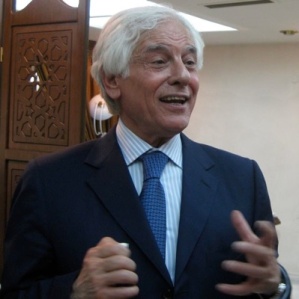By Kate Augusto and Dani Capalbo
Damascus, SYRIA – Syria will not make any overtures of peace toward Israel until the country returns its portion of the Golan Heights, said Syrian Minister of Information Mohsen Bilal to a crowd of 55 journalists and students last Thursday.

Syrian Minister of Information Mohsen Bilal spoke to a group of American students, and members of his own state-controlled media, in a press conference held last week in Damascus, Syria. (Photo by Dani Capalbo)
“Occupation is the mother of all problems,” Bilal said, blaming the conflict for every issue raised during a press conference at his ministry. Northeastern University political science professor Denis Sullivan also unexpectedly fielded questions from the audience as an incidental spokesman for the United States.
“We come here as – not reluctant ambassadors – but surprised to be ambassadors of the United States,” Sullivan said in his impromptu opening statements. “But we can take that role. I will accept that mantle on behalf of my students while they maintain their independent-minded journalistic digging and questioning and wondering and appreciating, which we’ve been doing since we started in Egypt.”
Since May 3, Sullivan has been leading a group of 26 Northeastern University students from their campus in Boston, Mass., through the Middle East. Their program included stops in Cairo, Egypt, Damascus, and Doha, Qatar.
Before opening the floor to questions, Bilal lectured the students on Syria’s contentious diplomatic relations with America under the George W. Bush administration. He also expressed hope for a reconciliation in light of President Barack Obama’s election and upcoming trip to the Middle East. The president is slated to address the Arab world from Egypt on June 4.
“Why America hates us?” Bilal asked. “We do not hate you and we hope you do not hate us … We are ready to make with you a full friendship. A full brotherhood.”
In 2003, the Bush administration launched the Syrian Accountability and Lebanese Sovereignty Restoration Act, known as the SAA, which prevents any imports to Syria comprised of more than 10 percent American parts, Bilal said. This has caused resentment from the Syrians toward the American government, and has deteriorated relations between the countries. Obama renewed the act last week.
Bilal and Sullivan took turns answering questions from the crowd, alternating between the students and professional Syrian journalists from the public and private spheres.
When asked about Syria’s history of nationwide bans on websites such as Blogger and Facebook, Bilal said through a translator: “No. 1, the network is not really perfect … No. 2, some websites are controlled and engineered by Israel. It’s not really good for our youth to have access to that.”
This was the only question Bilal answered in Arabic.
Bilal also used this opportunity to further address the Arab-Israeli conflict and the SAA, blaming the embargo for Syria’s inability to completely upgrade its fleet of civilian jets.
“Syria is still suffering from that embargo, as you know, and the United States itself has voted for the sanctions against us,” Bilal said. “And now we have fewer planes – I’m talking about civilian planes – because of the embargo and the American sanctions against us.”
He answered two more questions about the conflict, including an inquiry into Syria’s domestic priorities.
When asked about private media, Bilal deferred to professional journalists in the audience.
“Since we started operating five years ago, we’ve been covering everything – just everything – in Syria: political, economic, social,” said Dalia Haidar, a reporter for the privately owned monthly magazine Syria Today. “Our issues [cover] everything. And I can also say that we’ve been providing balanced articles about all issues and all controversial issues. Even … what we call in Syria taboos – we be talking about them.”
Despite some departures from the topic, Bilal made the Arab-Israeli conflict the centerpiece of the hour-long conversation. Syrian journalists also had the chance to question Sullivan. Those dealt almost exclusively with the conflict, as well.
“How do you see the right of resistance for those people who suffer from Israeli crimes against the families and children, especially when there is no hope of peaceful solution in our area?” one Syrian reporter asked.
Sullivan responded: “Could you ask me a direct question … because it seems like you have the answer in your question.” He then went on to address his definition of what a terrorist is vs. a member of a resistance movement.
To summarize, Bilal offered to continue talking with groups from Northeastern University, and said he hopes these sorts of conversations can begin to bridge the gulf between the two countries. “We are pro a new climate of friendship,” he said.